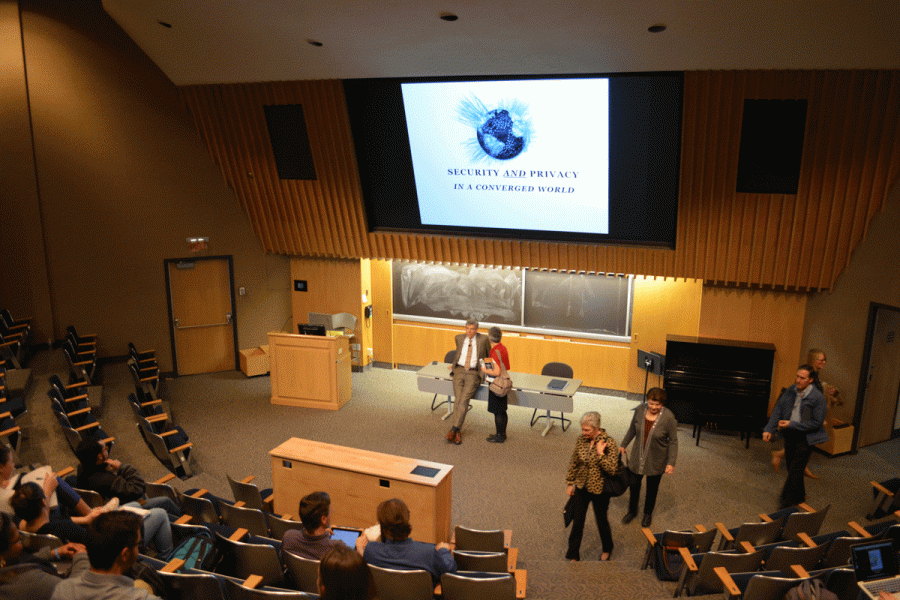Former NSA director talks privacy in a converged world
March 2, 2017
In the past few decades, the internet and cyberspace have played a significant role in both assisting and harming national security. On Feb. 23, Chris Inglis, professor of cyber security studies at the U.S. Naval Academy and former deputy director of the National Security Agency (NSA), spoke to University students about his career with the NSA and “security and privacy in a converged world.”
Inglis asked that his lecture be considered a “discourse on how the government thinks of its own power.” Inglis also responded to criticisms of the NSA following the Edward Snowden scandal in the summer of 2013; he explained “the vast majority of these problems in cyber space are actually attributed to human beings.”
“What we need in our society is a conflict of ideas, so we can use the diversity of those ideas to figure out which of them are the best and take advantage of those, however, too often this instead becomes a conflict of people,” Inglis said.
To further his point, Inglis referenced Geoffrey Stone, professor of law at the University of Chicago law School. Stone was an NSA skeptic who asked to observe the agency for an extended period of time as a part of former President Barack Obama’s review group.
“The NSA deserves the respect and appreciation of the American people, but it should never, ever be trusted,” Stone said in a statement following his study.
“Inglis himself is the first to acknowledge that he is not impartial, given his position in the NSA,” Professor of Political Science Michael James, organizer of the event, said.
Inglis went on to explain that the embodiment of the Constitution is to keep the government in check. He criticized citizens who claim that the government is too inefficient because “that’s how it was designed to be.”
According to the Preamble, “the government is meant to provide for the common defense, promote the general welfare, and secure the blessings of liberty. How do I achieve both collective security and common defense, and at the same time secure the blessings of liberty?” Inglis said.
Inglis went on to describe the guiding principles for the government’s exercise of power.
“Against all the commentary in the summer of 2013, the NSA was actually pursuing the defense of privacy to a much greater degree than it was pursuing national security,” Inglis said.
“I think it is important that the Bucknell community hear Inglis’s perspective on the NSA’s surveillance policy, given his deep knowledge of that policy, his broader experience with intelligence and national security, and his understanding of cyber-technology,” James said.
James acknowledged the delicate balance at work in modern society.
“Intelligence is, of course, crucially important to national security. Civil liberties are, of course, also crucially important to the well-being of a just and legitimate liberal democracy. Finding an acceptable balance between liberty and security is a perennial task for liberal democracies, one over which pitched political battles will inevitably be waged,” James said.
James explained that the department of political science found the topic of cyber-security particularly important, given recent political events.
“Inglis is one of the top experts on that topic,” James said.
“[Inglis] highlighted the constant tension between the need to provide for the security of the nation while also protecting the privacy and other rights of those who live there. Balancing these two constitutional requirements has only gotten more difficult in the digital age,” Associate Professor of Political Science Andrea Stevenson Sanjian said.
“There is a really large divide between what the media portrays and what is happening on the inside. I think it’s really constructive that he admitted that the NSA needs to be more transparent with the public with what they can and cannot do,” Sophia Hartman ’20 said.
“Inglis was at the forefront of a lot of what the NSA did to change their surveillance programs in the past decade, so his perspective was about as informed as you’re going to get,” Associate Professor of Political Science Chris Ellis said.
“It’s important to have students understand that many people within the intelligence community are doing their best to balance privacy and transparency while also achieving their primary goal of security,” Ike Lanier ’19 said.






















